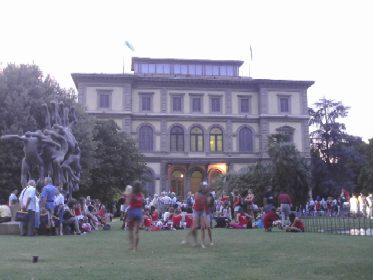
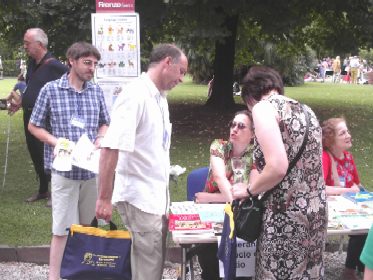
This was the Esperanto Association of Britain's site from 2005 to 2018. You will find its current site at esperanto.org.uk.
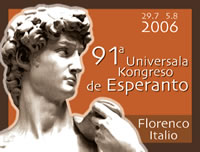 EAB News 2006-07-29 to 08-05: EAB at 91st World Esperanto Congress, Florence
EAB News 2006-07-29 to 08-05: EAB at 91st World Esperanto Congress, Florence
The first evening hosted an informal outdoor "getting acquainted" session, with many national associations, groups and societies presenting their activities. Angela Tellier manned a stall for Esperanto-Association of Britain (EAB), helped by Dominique Tellier, Malcolm Jones and Vilĉjo Walker, presenting EAB's latest books and DVDs, the annual Esperanto Summer Festival in Barlaston (Stoke-on-Trent), next year's British Esperanto Congress in Letchworth, and the Springboard to Languages programme.


Moira Macfarlane, the British Consul General in Florence, attended the formal opening ceremony of the congress; she was presented with a pocket Esperanto dictionary and an information pack on EAB's Springboard to Languages programme by EAB trustee Helen Fantom, who gave her a simultaneous translation of the opening speeches (which, like all of the events in the congress, were in Esperanto). However Mrs Macfarlane was pleased to find that her familiarity with several European languages allowed her to grasp the sense of some speeches directly. An innovation this year was the use of projection screens to relay pictures from the stage to the most distant corners of the hall, so that even people sitting well away from the main proceedings had a good view. Nevertheless, having a giant image of Paul Gubbins' head loom out of the darkness as he greeted the congress on behalf of EAB was a surreal experience!
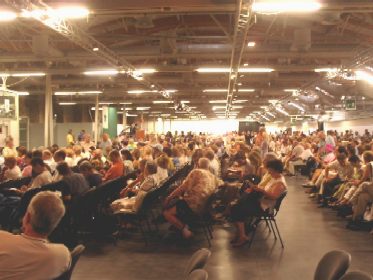
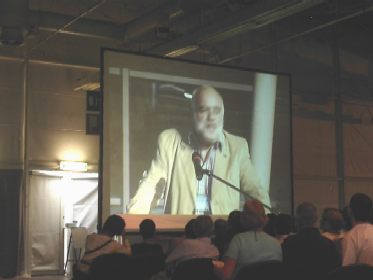
The congress programme was packed with the usual wide variety of talks, lectures, presentations and discussions. Those with an interest in foreign travel and cultures were well catered for; a series of lectures introduced Italian history, language and culture; various fora discussed wide-ranging international issues; Italian esperantist Daniele Binaghi presented a stunning exhibition of photographs from his 800-day voyage across the world. Pictured below are the Linux Esperanto User Group meeting, and the session where the presenters of Esperanto broadcasts on Radio Poland, Radio Havana Cuba, Vatican Radio and RAI met some of their listeners.
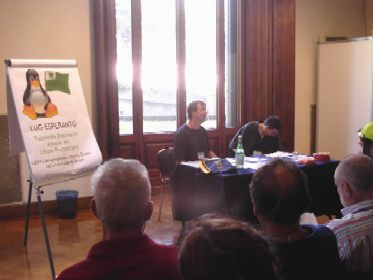
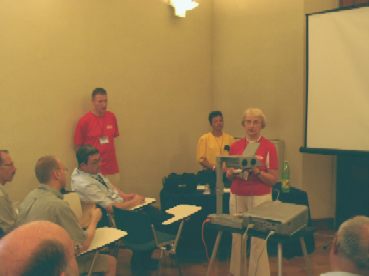
The programme also featured some excellent concerts for all musical tastes; shown below are pictures of the performances by Swiss Esperantists Ĵomart and Nataŝa with their ten-year-old daughter Carina, and by flautist Lidja Gomolackaite-Grudzinskaite from Lithuania with pianist Andrej Korobejnikov from Russia.
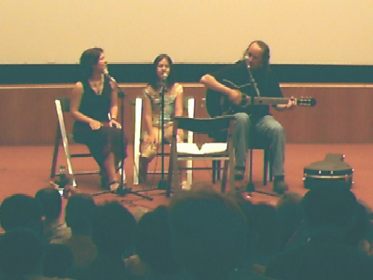
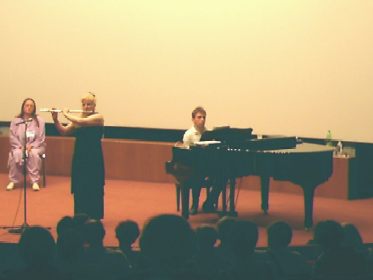
There was a strong British contribution to the theatrical events. British esperantist Paul Gubbins introduced a session of three light-hearted monologues to celebrate the 100th anniversary of the first theatrical performance at a world congress. French actor Henri De Sabates performed La pipfumanto (the pipe smoker), which was originally performed at the 2nd world congress in Geneva in 1906; British actor Colin Simmonds performed La duonokulvitro (The monocle), which is possibly the first published original drama in Esperanto; Croatian actress Vida Jerman performed Mi neniam amos (I shall never love) which was originally published in 1914. (A DVD of Colin Simmonds performing La duonokulvitro is available from the EAB bookshop.)
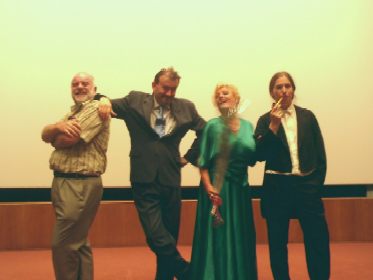
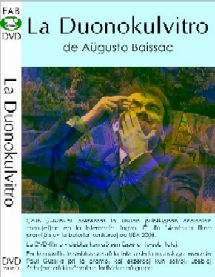
Paul Gubbins was also the author and director of a pair of plays, performed by the British troupe La Verda Ranaro (The Green Frog Army) to packed houses in two separate sittings; both of these plays had previously been awarded prizes in the 2004 Esperanto fine-arts competition. In Mikael kaj la monstro (Michael and the monster), a man suffering from motor-neurone disease is plagued by an irreverent chorus; it was performed by Colin Simmonds, Malcolm Jones and Jill Gubbins. In Pacaj batalantoj the Esperanto community is presented with a tremendous opportunity to advance the language - but at a price; it was performed by Sally Phillips, Peter Bolwell and Jan Swynnoe. Other British esperantists sold copies of the scripts in book form, the proceeds of which helped to defray some of the expenses of mounting the production.
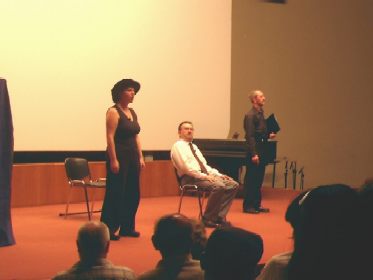
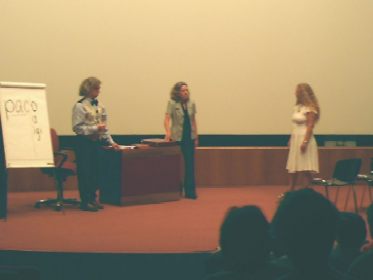
British Esperantists Helen Fantom, Jill Gubbins and Elizabeth Stanley also contributed to items in during the 'international performances' evening.
The city of Florence is famous for its palaces and galleries of renaissance art. Esperantists took the opportunity to enjoy the city and its surrounding countryside on some well-organised excursions. Another technical innovation at this congress was the use of walkie-talkie technology; everyone in a group was issued with a personal receiver and in the earpiece could hear the Esperanto translation of the local professional guide's explanations, despite the hubbub of a packed and busy city.
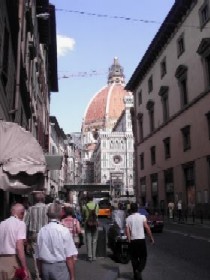
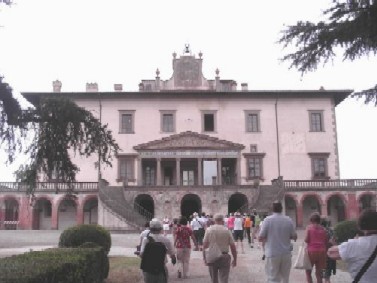
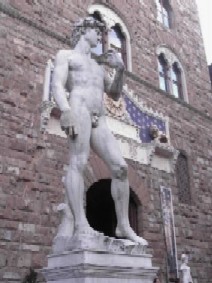
The congress also provided many informal opportunities for Esperantists to meet, chat and get to know each other. The congress was situated next to the main railway station, and the workers there kindly invited participants to use their staff canteen, so many esperantists were able to dine together, chatting in Esperanto and enjoying dishes with a local flavour (at very reasonable prices!). The all-day excursions provided additional opportunities to eat together; those visiting the Medici villas had lunch in a hill-top restaurant with stunning panoramic views of the Tuscan countryside.
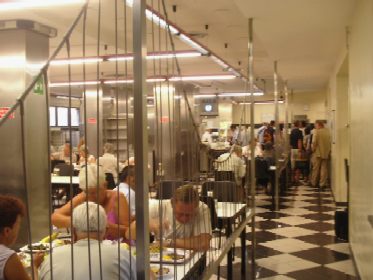
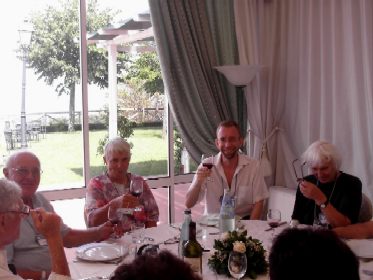
The city of Florence provided a warm and hospitable venue for the congress; the congress badges gave free entry to several of the city's outstanding attractions, including the Uffizi Gallery, the Pitti Palace and the Boboli Gardens; the mayor hosted a formal reception for esperantists in the town hall; an ecumenical service in Esperanto was held in the Basilica of St Lawrence; the congress' 'Italian Evening' started with a traditional display of flag-tossing in the Piazza della Signoria.
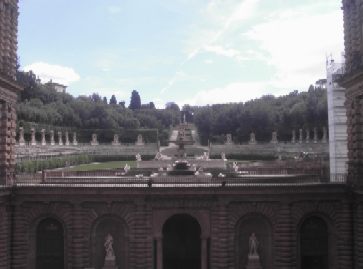
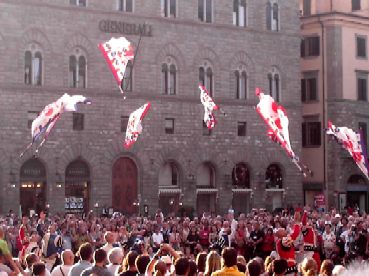
This was the 91st World Esperanto Congress in a series which started in 1905 and has taken place each year, interrupted only by the two world wars. At these events, Esperantists participate in a rich programme of talks, lectures, concerts, plays and excursions, all conducted in Esperanto, and all without the need for translators or interpreters (apart from an occasional concession to the few visiting dignitaries who haven't mastered the language). For many Esperantists, the real highlight of the event is simply to meet face-to-face and chat directly with people from across the world, without having to learn their many national languages, and without imposing our own national language and culture on them.
Each year's congress is organised by Esperantists in the hosting country and the Universala Esperanto-Asocio [World-wide Esperanto Association]. Some previous congresses have taken place in Britain; in 1907 (Cambridge), 1926 (Edinburgh), 1930 (Oxford), 1938 (London), 1949 (Bournemouth), 1961 (Harrogate), 1971 (London) and 1989 (Brighton). Next year's congress will be in Yokahama, Japan.
- Report and photos by Vilĉjo Walker